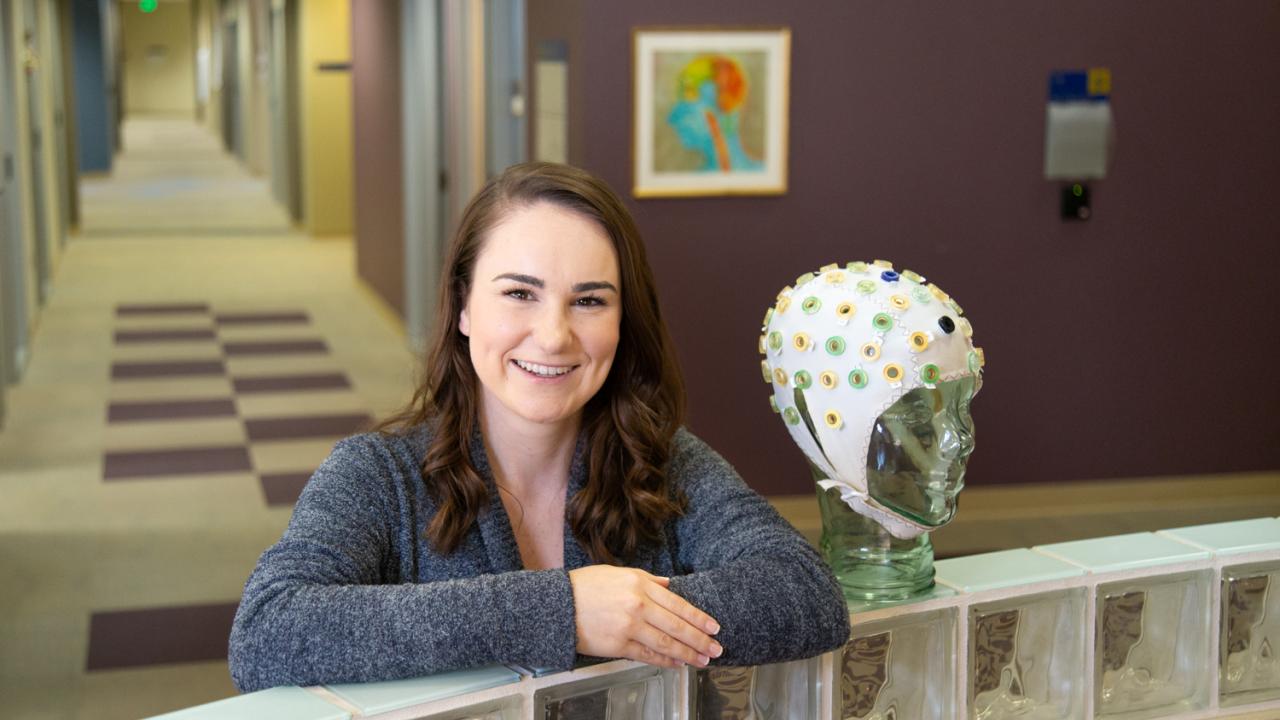
College Medalist Kelsey Klein Eyes Medical Industry and Charity after Graduation
Quick Summary
- Kelsey Klein is a graduating neurobiology, physiology and behavior major
- During her time at UC Davis, Klein studied the relationship between gaze and attention mechanisms in the brain
- For her research, community service and scholarship, Klein was recently awarded the College of Biological Sciences Medal, the college's top accolade
Last year, UC Davis undergraduate student Kelsey Klein began a project close to her heart. With assistance from the National Society of Leadership and Success, her idea to create a nonprofit organization benefiting prostate cancer research took shape. She wrote plans, learned about budgeting and researched organizations like Movember and events like the Susan G. Komen Race for the Cure.
“My dad got diagnosed with prostate cancer eight years ago, so this is inspired by him,” said Klein, a neurobiology, physiology and behavior major.
Klein envisioned creating a charitable race event called “Pedal, Paddle, Par,” because her dad loves biking, paddleboarding and golf.
“He described his ‘perfect day’ as going for a bike ride, getting on his paddleboard and then playing a round of golf, all with his family and friends,” Klein said. “We want to create a non-profit organization that allows participants to experience this ‘perfect day’ while also raising money for an important cause so personal and close to our hearts.”
Since finishing her undergraduate coursework at the end of the winter quarter, Klein has continued working on this project while also conducting lab work at the Center for Mind and Brain. For her outstanding community service, research activities and scholarship, Klein is recognized with the College of Biological Sciences Medal.
“I was pretty surprised to get it honestly,” said Klein, noting she’s met so many amazing students doing excellent work, from community service to research, all across campus. “I’m just so honored.”
Science runs in the family

Growing up, Klein had firsthand access to medical knowledge. The daughter of two optometrists, she loved learning about the biological machinery within the human body. But nothing compared to the brain’s complexity. Klein wondered, how did all the neurological pathways and components lead to sensory experience, logic and emotion?
Klein continued fostering this interest at UC Davis, where she initially enrolled as a biomedical engineering major. After switching to the College of Biological Sciences, she sought research opportunities through the Accelerating Success by Providing Intensive Research Experience (ASPIRE) program, which places first and second year honors students in a UC Davis faculty member’s lab for a long-term research experience. Based on her interests, the program paired Klein with Distinguished Professor Ron Mangun.
“My lab is focused on understanding the neural mechanisms of attention,” said Mangun, who holds appointments in the Departments of Psychology and Neurology.
In the lab, Klein studied relationships between attention mechanisms in the brain’s early visual cortex and eye gaze, using methods such as eye tracking and electroencephalography (EEG). “We’re looking at how people pay attention in space and what pathways in the brain allow that to happen,” she said.
Understanding the relationship between gaze and attention mechanisms is “important both for developing better human-machine systems and for understanding and treating psychiatric, neurological and visual disorders, many of which have attention deficits at their core,” said Mangun, who praised Klein’s theoretical knowledge, empirical savviness and lab skills.
Klein also nurtured a love for writing during her time at UC Davis. A professional writing minor, she completed a writing internship at the UC Davis Medical Center, where she assisted in writing a psychological treatment manual.
“It was so cool to be able to connect that writing experience with the information I was learning in other science classes,” she said.
Klein’s writing also earned placement in last year’s edition of UC Davis’ Prized Writing. Klein wrote a literature review on the correlations between lifestyle factors and BRCA-related breast cancer in women. Mutations of the gene BRCA2 are also related to prostate cancer in men.

Saying goodbye to Davis
As Klein prepares to graduate, she’s looking to the future. She’s already lined up her “dream post-grad job” in Irvine, where she’ll work as a product specialist for NeurOptics, a medical device company specializing in pupilometers. These devices provide objective pupil size and reactivity data, which are critical indicators of neurological health for patients admitted into intensive care units.
“Today many hospitals have physicians or nurses do manual assessments of pupil size and reactivity just using a pen light or flashlight, which isn't very accurate and can lead to poorer patient outcomes,” said Klein. “I am thrilled to be part of the team working to make this technology the standard of care in neurocritical cases.”
Klein said she’ll look back on her time at UC Davis with love. “I am so grateful for all of the incredible students and faculty I’ve had the opportunity to meet and work with while here doing so many different activities from tutoring to research to being involved in my sorority, Kappa Alpha Theta,” she said. “I knew I could be happy here and I was right.”
